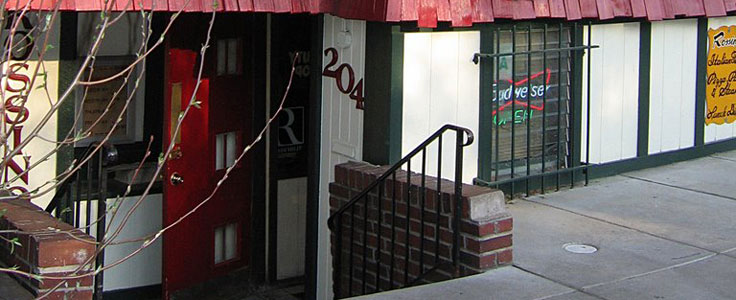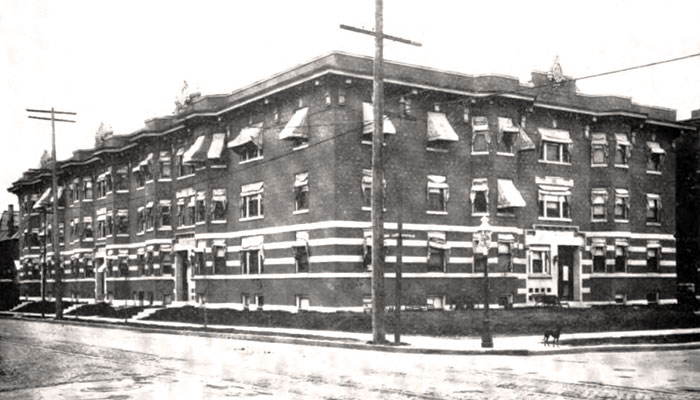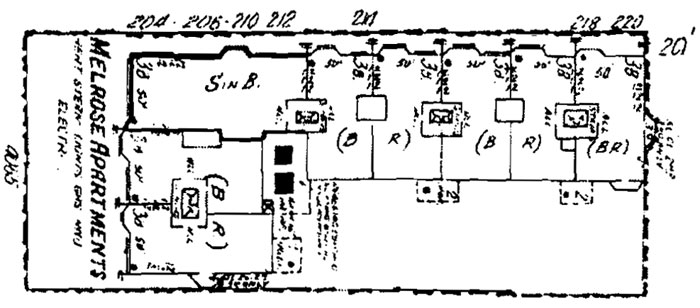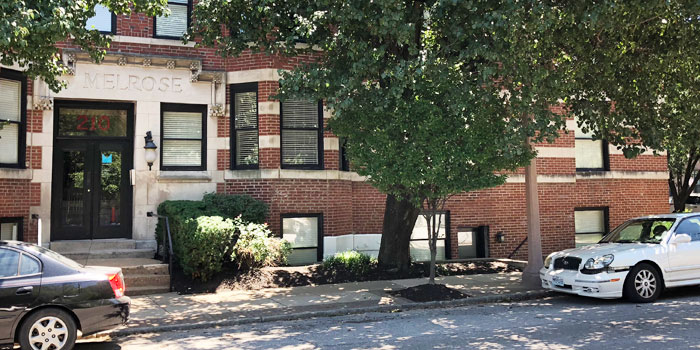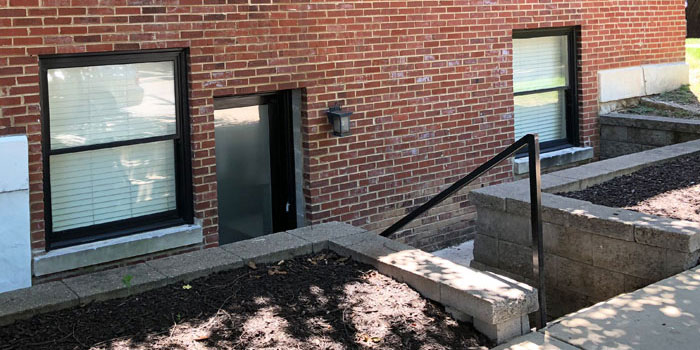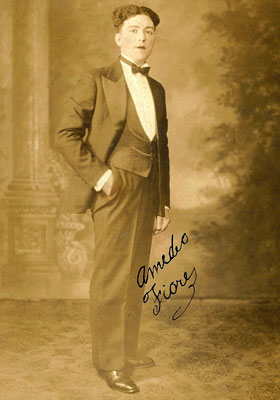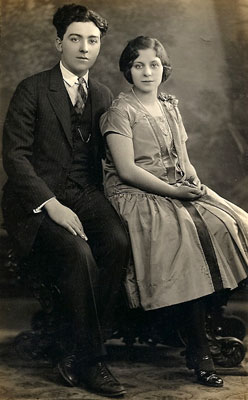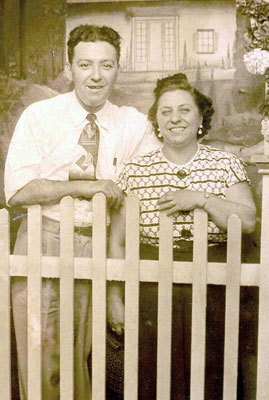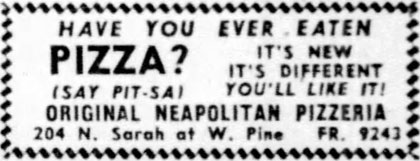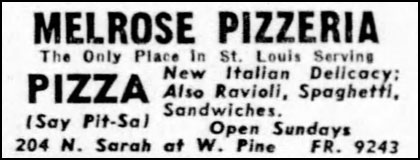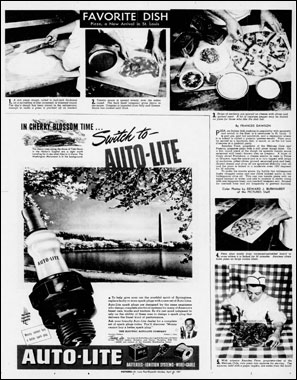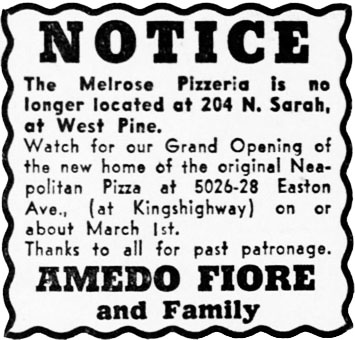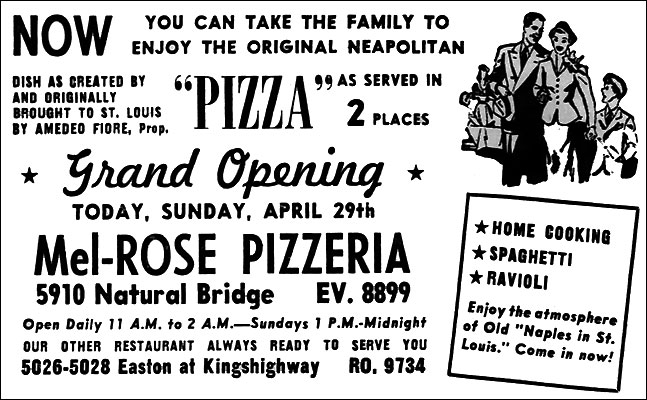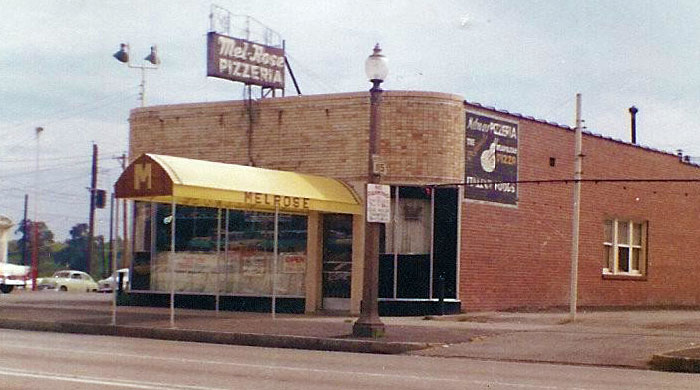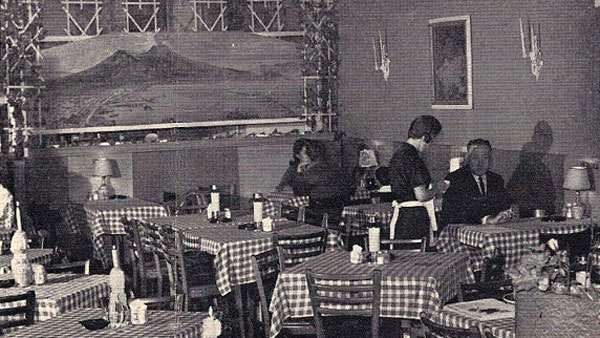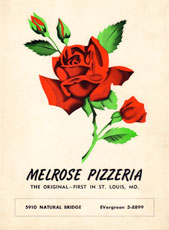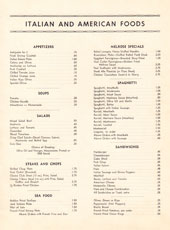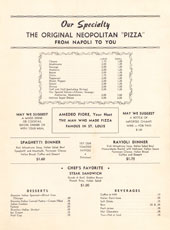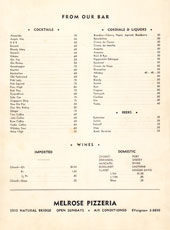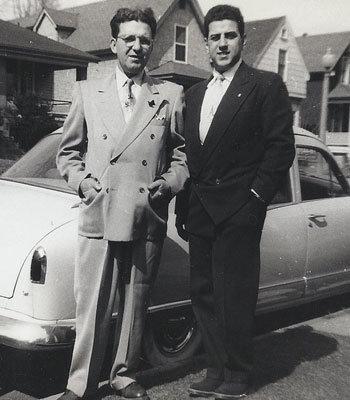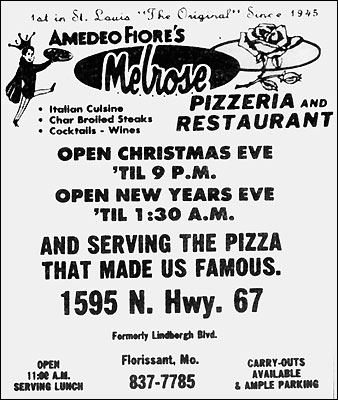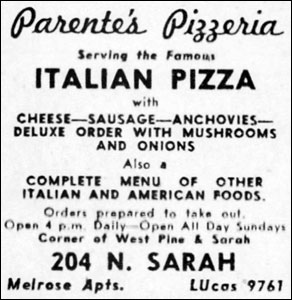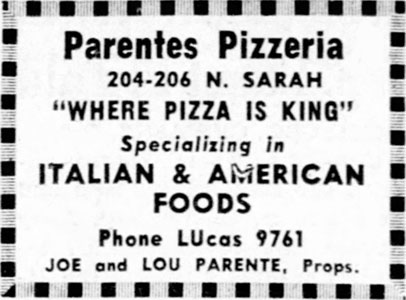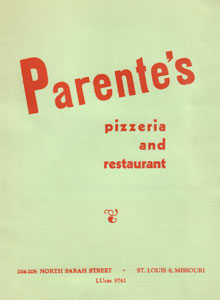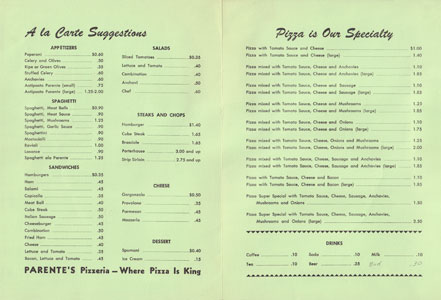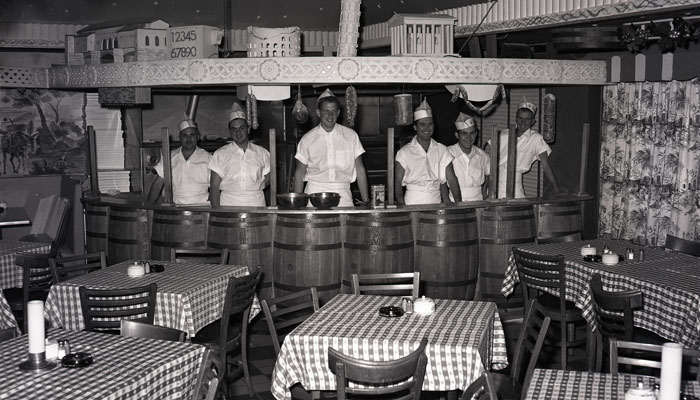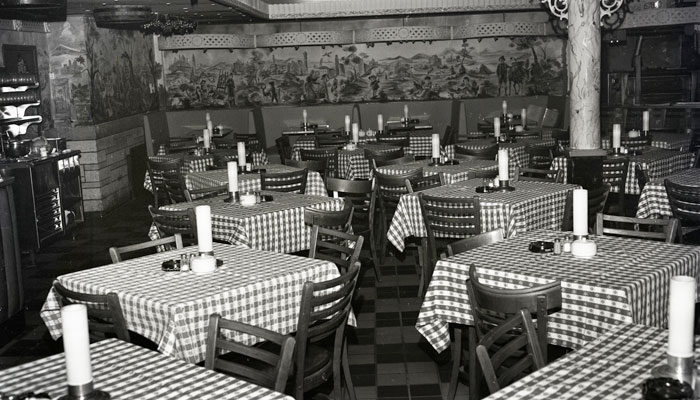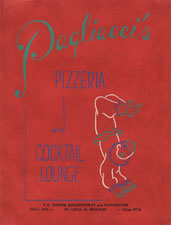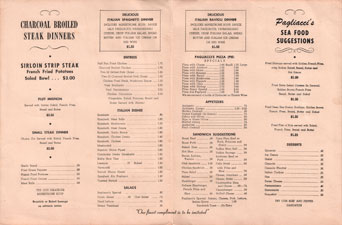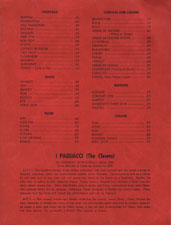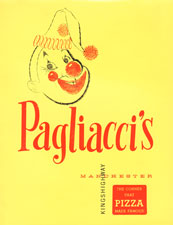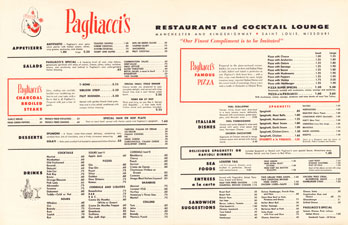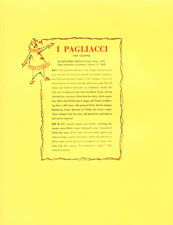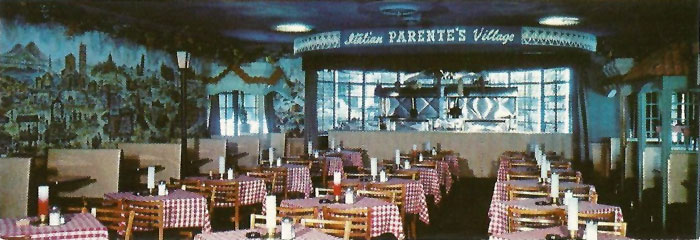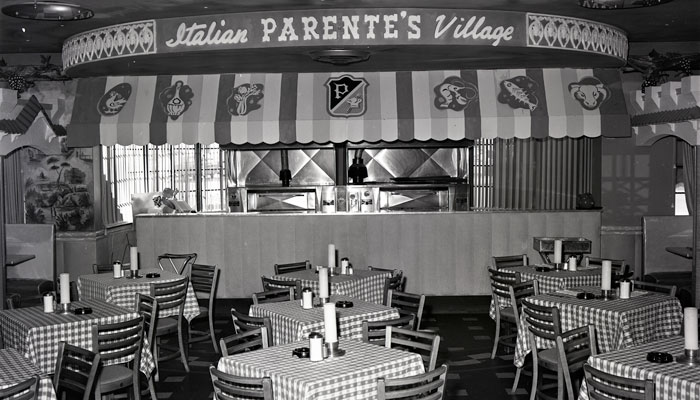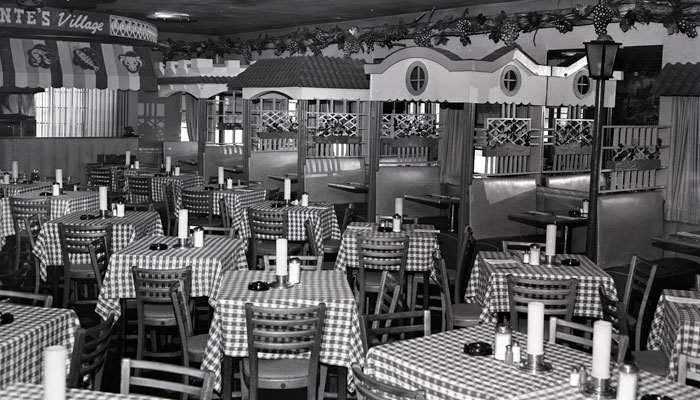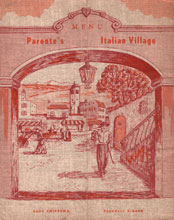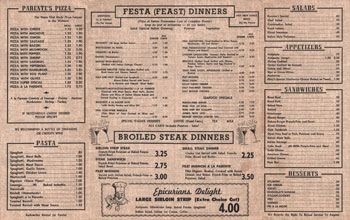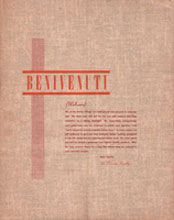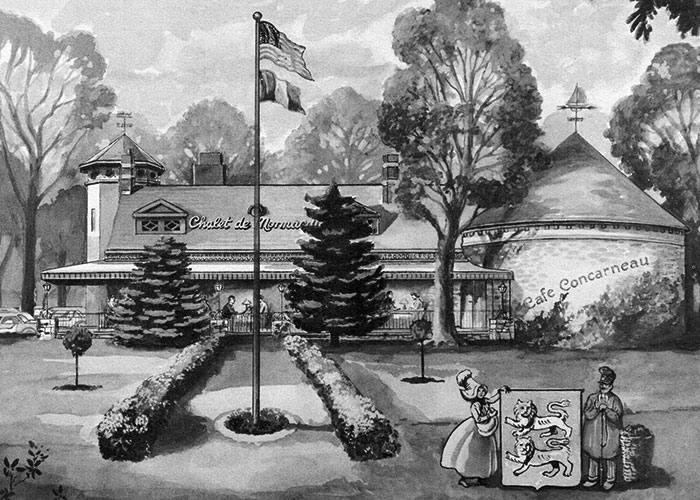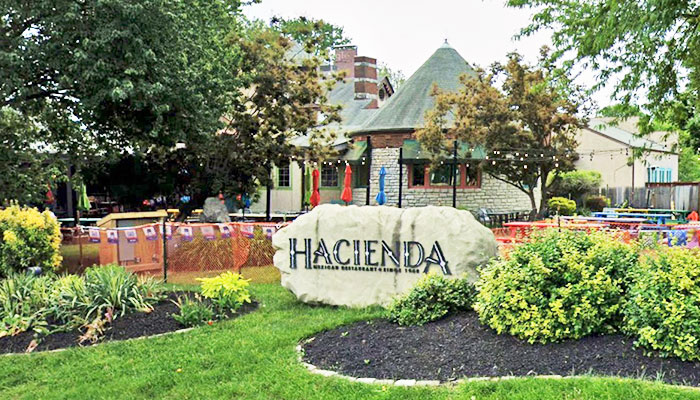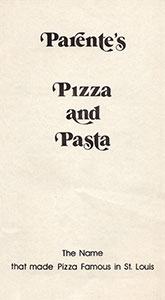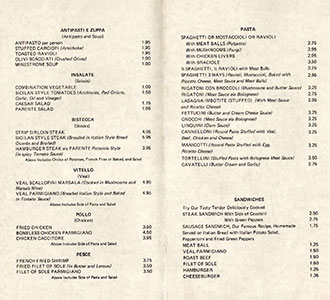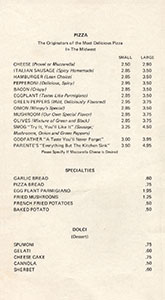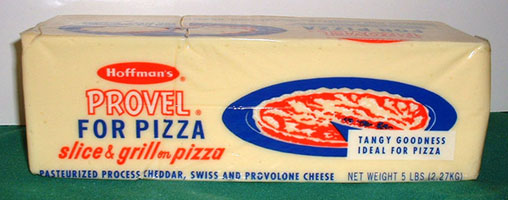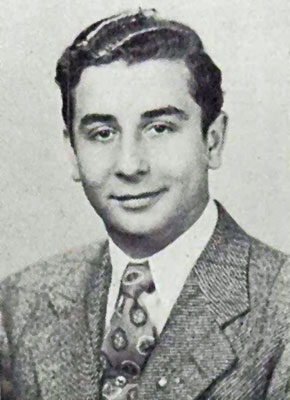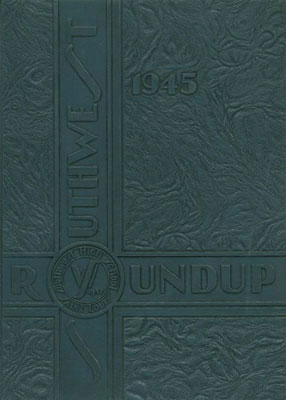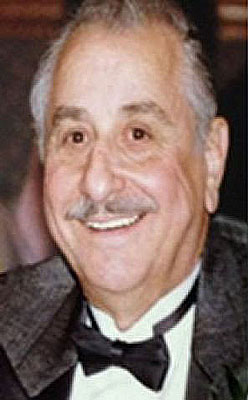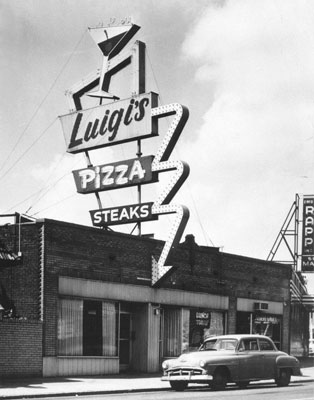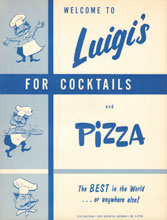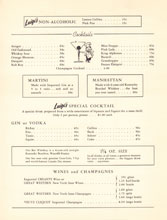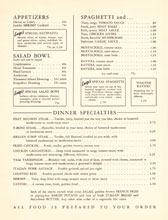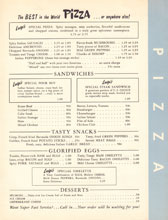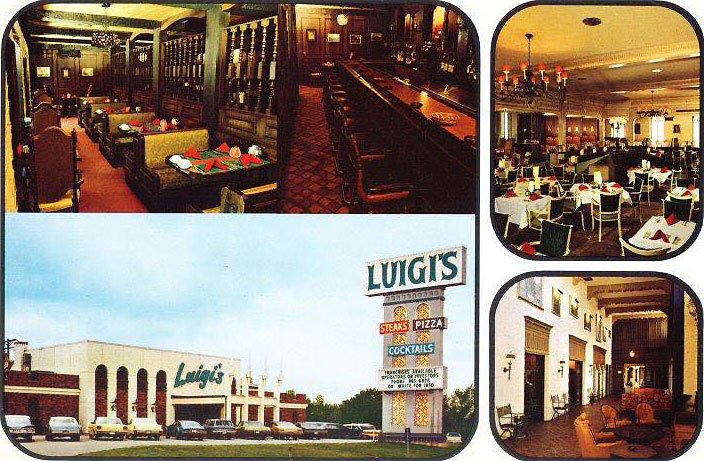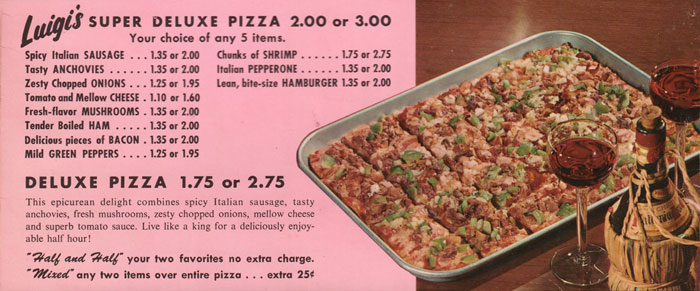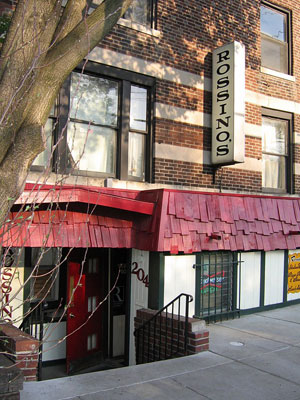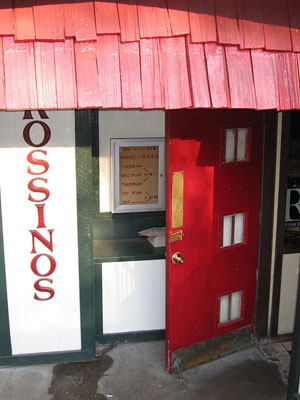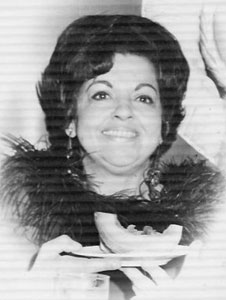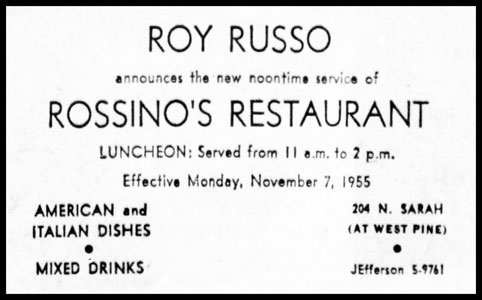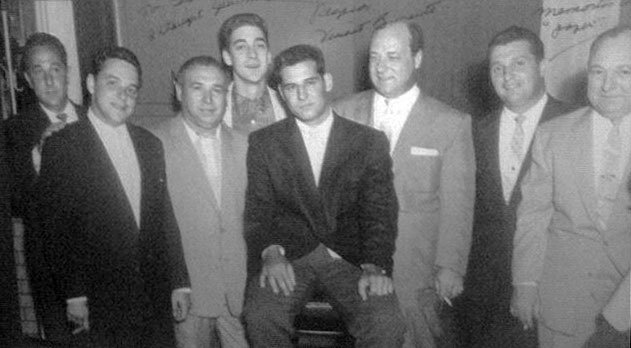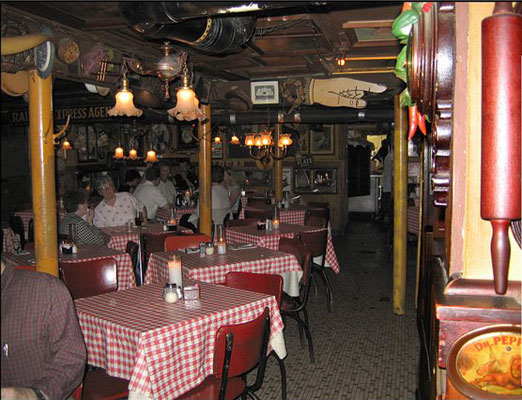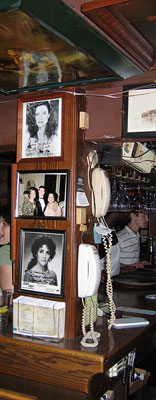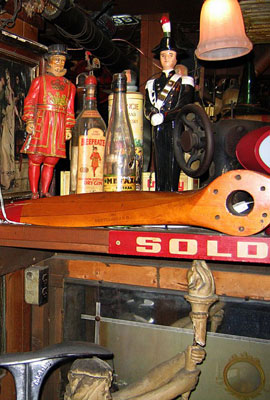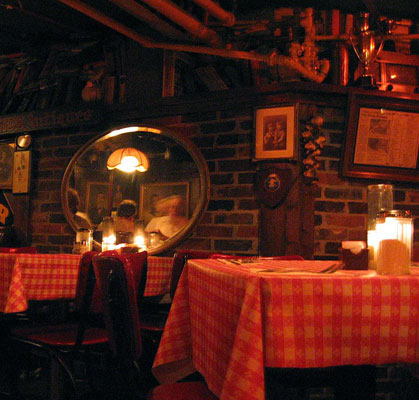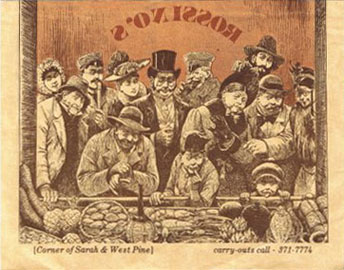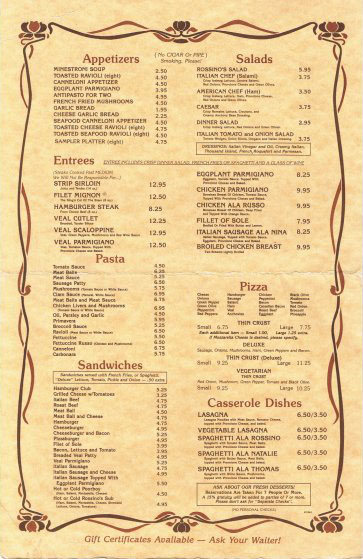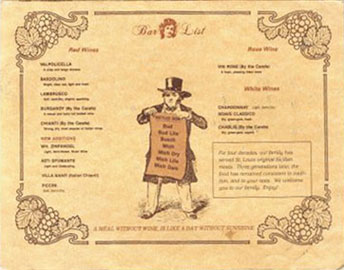|
Pizzerias
Melrose Apartments
The Melrose Apartments were constructed in
1907. Three stories tall, with a raised basement, the L-shaped,
red-brick building fronted west on Sarah and south on West Pine. The tall
basement allowed for sufficient light for commercial use. Older
tenement-style buildings provided only cellars or storage areas in
dim, low-ceiling basements, with commercial use only in first floor
storefronts. The Melrose Apartments demonstrated that modern
apartment buildings in St. Louis could efficiently utilize all
interior space, even the basement.
The basement space at the corner of Sarah and West Pine was given the double street address 204-206. The tenants that occupied the space over the years sometimes chose one address, sometimes the other, sometime both and sometimes the addresses were used interchangeably.
The 1910 photograph above shows small ground-level windows on the western facing side of the corner basement. The exterior door to the basement, shown in the 2018 photographs below, would have been added when the space was first used commercially.
By early 1931, the Melrose Food Shop occupied
the basement space at 204-206 N. Sarah. A combination restaurant,
delicatessen and confectionary, the eatery changed hands a number of
times between 1931 and 1945. On October 7, 1945 the restaurant was once again on
the market.
Melrose Pizzeria Amedeo Fiore was born in Chicago on April 12, 1903. His parents had immigrated to the United States from Italy and Fiore was proud of his Italian heritage. He visited Italy at age 18, sailing from Naples on May 2, 1921.
Fiore moved to St. Louis with his wife,
Elizabeth, sometime between 1935 and 1939. He was director of the
Italian Radio Theater, which presented a program each Sunday on
station WEW. He was a tenor and sang with The Muny and with the New
York Metropolitan Opera when it appeared in St. Louis.
In 1940, Fiore worked as a used car salesman at Bilgere Chevrolet on Natural Bridge. In a November 17, 1940 St. Louis Post-Dispatch ad for the dealership, Fiore exclaimed, "Gosh! I just came to work here – but, oh boy, have we real bargains in used cars and trucks. To my many Italian friends . . . I would appreciate a call if interested in a car." By 1942, Fiore was working at Emerson Electric on W. Florissant Avenue. He placed a classified ad in the June 15, 1945 St. Louis Post-Dispatch offering his services as a handyman:
But Fiore's handyman days came to an end some time after October of 1945 when he purchased the advertised restaurant space in the basement of the Melrose Apartments. Amedeo and Elizabeth Fiore opened a small Italian restaurant at 204 N. Sarah which they called the Melrose Cafe. The restaurant was frequented by a diverse clientele, including guests from the Chase Hotel, sent there by Hack Ulrich, manager of the Chase Club. Legend has it that when hotel guests complained to Ulrich there was nowhere to go in St. Louis for pizza, he convinced Fiore to add it to his menu. Fiore ordered an oven and developed a special recipe; St. Louis style pizza were born. The Fiores were serving pizza at their restaurant by November 8, 1946. A St. Louis Post-Dispatch advertisement on that date introduced the new Italian delicacy to St. Louisans and taught them how to pronounce it.
The Fiores changed the name of their restaurant
from the Melrose Cafe to the Original Neapolitan Pizzeria. However,
since the new name was a mouthful, they soon changed it to
the Melrose Pizzeria.
In a classic 1947 St. Louis Post-Dispatch article, Fiore demonstrated how to make "pizza, a new arrival in St. Louis." This was the first documentation of what we today call St. Louis style pizza, culminated by the caption under Fiore's photo:
By the end of 1947, Fiore
had closed his restaurant at Sarah and West Pine, reopening it
in March of 1948 at 5026-5028 Easton. On April 29, 1951, Fiore
opened a Melrose Pizzeria at 5910 Natural Bridge.
By July of 1969, the Melrose Pizzeria on Natural Bridge had closed its doors and Amedeo and Elizabeth Fiore had moved to California. But the pizzeria lived on. Amedeo Fiore, Jr., who had taken over operation of the Natural Bridge restaurant from his parents, opened a Melrose Pizzeria in Florissant. He served "The Original" St. Louis pizza there until early 1977.
Parente’s Joseph Parente was born in St. Louis on August 5, 1920 and his brother Louis was born just over one year later on August 21, 1921. Their parents had immigrated to the United States from Italy.
The Parentes got their
start in the restaurant business under the tutelage of Amadeo Fiore
at his Melrose Pizzeria at Sarah and West Pine. They worked there as
busboys and then as waiters. When Fiore moved
his restaurant to Easton Avenue at the end of 1947, he sold the
space in the basement of the Melrose Apartments to the Parente
brothers, and they reopened it as Parente's Pizzeria.
The Parentes' restaurants were known for
hospitality and great Italian food. Joe could usually be found at
the stove, while Lou was more of a front man. The restaurants were
popular places for sports and entertainment figures, their walls
adorned with autographed photos of well-known customers. In 1950, Joe Parente left his brother Lou to open Pagliacci’s Pizzeria and Cocktail Lounge at 4592 Manchester and Kingshighway with partner Bob Cassulo. In 1953, they sold the restaurant to Peter Grana and Bob Calcaterra. Calcaterra sold his interest to Grana a few years later, and Grana operated the popular restaurant until it closed in 1973.
Pagliacci's
boasted a "glass-enclosed corner-kitchen" where customers could
"see how real Italian Pizza is built, babied and baked to perfection
as only Pagliacci's chefs know how."
Pagliacci’s baked
their pizza "with a thin, crisp crust blanketed by sweet, bright
tomatoes, tangy imported Italian Cheese, and the correct touch of
seasonings." The "Pizza a la Pagliacci" included mushrooms, onions,
sausage, anchovies and tasty chunks of roast Tom Turkey.
After Joe Parente sold Pagliacci's, he rejoined
his brother Lou, and in early November of 1954 they opened Parente’s
Italian Village on Chippewa at Watson in a building that had once
housed the Shangri-La restaurant. By the end of November, the
Parentes had sold their original restaurant at Sarah and West Pine.
The Parentes' new restaurant flourished. But on the morning of April 5, 1963, a fire started in a basement storeroom. Dense clouds of smoke billowed across Chippewa and Lansdowne, and flames shot through the roof of the one-story building. Parente's Italian Village was virtually destroyed, with damage exceeding $100,000.
The Parente brothers chose not to rebuild; they
eventually sold the building to Roy Russo in 1964, who
reopened it as Saro's Sunny Italy. Instead, the Parentes
reopened Parente's Italian Village on Manchester Road in Rock Hill.
The turreted building at 9748 Manchester Road that housed the new
restaurant was built in 1861 as the home of steamboat captain Mils
T. Redmon, whose guests included Ulysses S. Grant. The first use of
the building as a restaurant was as Chalet de Normandie, in 1951.
In 1965, Joe Parente went out on his own and opened Mama Parente's at 2524 Hampton, on the northeast corner of Hampton and Columbia Avenues. In 1969, he sold it and rejoined his brother. In 1974, the Parentes closed Parente's Italian Village — the turreted building would become Oliver's and then Hacienda.
In the fall of 1975, the brothers opened a Parente's
restaurant at 5356 Daggett Avenue, at the corner of Macklind on the
Hill. The new restaurant retained the homey touches
the Parentes were known for. There was a sign saying "Parente’s
has it from Antipasto to Zabaglione" and another in front of the
kitchen noting that "the finest meat balls in the world pass through
this door." And there was plenty of pizza on the menu, including a
sausage, mushroom, onion and green pepper offering, with the acronym
SMOG. In 1977, the Parents closed their restaurant on Daggett, and Joseph Parente retired from the restaurant business. But Lou Parente wasn't finished selling pizza. In 1981, he opened Parente’s Pizza at 9824 Manchester in the Rock Hill Shopping Center, and in 1983, he opened Parente’s on Pershing at 5501 Pershing as part of the remodeled DeBaliviere area. Both restaurants offered pizza, with a thin crust and lots of toppings. Louis Parente eventually sold both businesses and retired to Florida. He died on March 7, 2001 at the age of 79. His brother Joseph died on September 15, 2001 at the age of 81. * * * * * St. Louis style pizza is a distinct type of pizza popular in the Midwestern American city of St. Louis and surrounding areas. The definitive characteristics of St. Louis style pizza are a very thin crust made without yeast, the common (but not mandatory) use of Provel processed cheese, and pizzas cut into squares or rectangles instead of wedges. The sauce is often seasoned with more oregano than other pizza types. Luigi's
Luca "Luigi" Meglio was born on
November 22, 1927 in St.
Louis, the oldest son among five children, including two older
sisters and two brothers. His parents were from Italy. His mother
was a seamstress. His father had a series of jobs – cobbler, street
lantern lighter and mason. After graduating from Southwest High
School in 1945, Meglio joined the Marines and was sent to China. While
he was there, his father died.
Meglio returned home to work as a waiter at the restaurant in the basement of the Melrose Apartments operated by his cousins – the Parente brothers. His mother, Angiolina Meglio, was a Parente. She told her son, "If they can do it, we can," and mortgaged her home on Morganford Road in South St. Louis to help him get started.
In January of 1953,
Meglio opened Luigi’s Restaurant on Watson Road at Arsenal. His
mother worked in the kitchen. The restaurant used her recipes and
sold Italian food. Pizza was a hot seller. His brother Frank started
behind the bar and his brother Tony started as a waiter.
The restaurant prospered, and the overflow of
customers resulted in Meglio opening three more Luigi’s – at 8965
Natural Bridge, at 12870 Manchester and at No. 55 Village Square, in
the Village Square Shopping Center.
Meglio was known as an innovator. He instructed his waitresses to introduce themselves by leaving their name tags at each table. Noticing that four round pizza pans didn’t fit easily on top of a restaurant table, he began serving his pies in rectangular pans. He made thin crust pizzas with Provel cheese, and was among the first to offer unusual toppings, such as pineapple and ham.
Meglio invented a better pizza oven. He took
two Bakers Pride ovens, cut off the sides, and linked them together
with a conveyor belt to speed up production and cook the pizzas
uniformly.
At 5:30 in the morning on Jan. 2, 1977,
Meglio's brother Frank was making a deposit at Southwest Bank on
South Kingshighway. He was shot in the back and robbed of $2,000,
leaving him partially paralyzed. Police arrested a former dishwasher
and pizza maker who had worked for the Meglios during his high
school years. Luca "Luigi" Meglio died on August 28, 2014 at the age of 86. Rossino's
Rossino's was the third pizzeria to inhabit the
basement space in the Melrose Apartments at 204 N. Sarah, following
on the heels of Parente's Pizzeria. Roy & Nina Russo and Frank &
Marian Gianino took over the space in late 1954, combining their
surnames to christen the new restaurant. The Gianinos soon departed, leaving
the Russos as Rossino's sole owners.
Nina “Lee” Faille Russo was born in Rome,
Georgia on June 7, 1922. She moved to St. Louis as a child. Her
father died when she was a teenager and she dropped out of school to
help support her family. She married Roy Russo in 1941.
Roy Russo was the face of Rossino's. He can be seen in a classic early 1960s photo with Lou Parente, Bob Cassulo (Joe Parent's partner at Pagliacci’s) and other prominent St. Louis restaurateurs.
Rossino's was dimly lit, with low
hanging pipes overhead. Joe Pollack, the late Post-Dispatch critic,
wrote that the basement restaurant was "especially popular with short persons and
athletic types with reflexes good enough to duck the pipes...." The
decor included a fascinating clutter of sports memorabilia, old
signs, photos, advertisements, mirrors, paintings, books, trophies,
license plates and bottles.
The menu included a
classic Italian salad with salami, provolone, olives and a sweet
vinaigrette; a unique chicken-liver-and-mushroom pasta and another
pasta made with Rossino's rich, tangy marinara; and a distinctive
rectangular pizza made with mozzarella or provolone or both. Many of St. Louis' Italian restaurateurs got their start at Rossino's. Roy and Nina Russo's daughter Nancy, who with her husband Tom Zimmerman bought Rossino's from her parents in 1963, laid out the lineage.
Roy Russo died in 1976. Tom Zimmerman was killed by a drunk driver in 1986. Nancy continued to run Rossino's with the help of her mother Nina and her son Rory until April of 2006, when she retired and the restaurant closed its doors. * * * * * The Fiores, the Parentes, the Meglios and the Russos set the stage for the pizzerias that would follow; Pastori's on Laclede, Cusanelli's on W. Pine, Di Martino's on Shaw, La Contessa on Delmar, Marietta's on Clayton, Charlie Mittino's on Watson, Dettoli's on Jefferson, Kemoll's on N. Grand, Rinaldi's on Delmar, Garavaglia's on Watson, Yacovelli's on Big Bend, Ponticello's on Goodfellow, Staebell's on Southwest, Lombardo's on W. Florissant, Antonio's on Gravois, Rose's on Franklin, Sala's on Newstead . . . and lots more.
Copyright © 2024 LostTables.com |
|||||||||||||||||||||||||||||||||||||||||||||||||||||||||||||||||||||||||||||||||||||||||||

